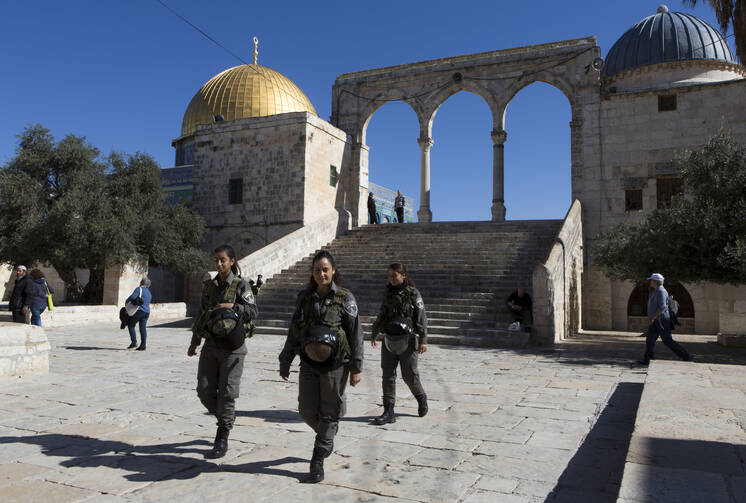The United States and Europe should engage in “strong mediation” to bring an end to the violence that is spreading in Jerusalem and the Holy Land, Bishop William Shomali, the Palestinian-born auxiliary bishop of the Latin Patriarchate in Jerusalem, told me in an interview, November 20.
He went on to call for the implementation of the two-state solution to resolve the more than sixty-year old Israeli-Palestinian conflict, and insisted that “this should not be left to the good will of the two peoples in conflict; it should be imposed on both sides.”
Q. How do you read the situation today in Jerusalem, after the attack on the synagogue?
A. There is a dramatic escalation in violence, nourished by religious hatred between Muslims and Jews. We deduce this from the fact that the confrontation took place around the Al Aksa-Temple Mount, as well as in synagogues and mosques.
The attack against the synagogue Har Nof in Jerusalem is cruel and appalling and reminds us of the genocide committed twenty years ago by an Israeli-American Jewish settler Baruch Goldstein who massacred 29 people in the Ibrahimi Mosque in Hebron. Goldstein’s attack with an automatic assault rifle left 125 wounded. We do not want such old and new scenarios to be repeated.
Q. You live in Jerusalem, what is the atmosphere there now?
A. It is tense. We have entered in the vicious circle of killing, funerals, retaliation, other funerals and new threats, destruction of houses. Many Arab workers in Israel have been fired as a result of this mistrust.
This is what happened at the beginning of the second intifada, it’s something that few people really want to repeat.
Here I want to add that the image of Palestinians has been tarnished. Abbas, who is a peace-maker, feels that this last scenario is destructive to his peace efforts.
Q. What is the position of the church leaders on all this?
A. We visited together the Al Aksa-Temple Mount in order to condemn violence and we visited yesterday the Har Nof synagogue to express our disgust at this terrible killing. And today (November 20) we organized prayers with pilgrims in Bethlehem and in Jerusalem. We believe that peace and reconciliation need a supernatural push.
Q. The attack on the synagogue is but the latest in a series of attacks and killings that is spreading terror in Jerusalem and the Holy Land. Could you comment on the context in which all this is happening?
A. The context is the failure of the peace process at the end of April 2014, and the aftermath of the Gaza war which left people with empty promises regarding the reconstruction of their cities.
Q. There has been a lot of trouble around the access to the Temple Mount, could you say what is happening?
A. Some Jews want to divide Al Aqsa-Temple Mount with Muslims in terms of time or space as they had done in Hebron some 20 years ago. Every day settlers and Orthodox Jews enter to pray there. Their prayers are considered by Muslims as a provocation. The Israeli Government has reiterated that no change will happen in the Temple Mount area and that the old Status Quo will be respected. This decision calmed the souls. But the escalation started and it is not easy to stop it.
Q. There has been an expansion of plans for settlements also in East Jerusalem. What does this mean?
A. This means the intention is to make Jerusalem more Jewish and less Palestinian.
Q. Prime Minister Nethanyahu is promising another ‘hard’ response. Where is all this leading?
A. Any hard response will lead to more violence and to the further undermining of the peace process.
Q. What are religious leaders doing in this seemingly downward slide to ever more violence?
A. We, Christian leaders, publish statements and appeal for peace and for prayers. I am sure that Jewish and Muslim religious leaders also pray for peace and, like us, they are unhappy at this escalation. But sometimes we seem so helpless. Politicians have the power and are the decision-makers. What is positive is that the Palestinian Government is making a lot of efforts to prevent a third Intifada. Abbas does not want it, and he stopped the second one.
Q. Do you see any hope for peace in the short or medium term?
A. If there is a strong mediation from Europeans and Americans, the mechanism which we have entered can be repaired. Before peace comes, we dream of a period of calm for building more trust.
Q. What is necessary for peace to come about?
A. The two-state solution should be implemented according to the international resolutions and laws. But this should not be left to the good will of the two peoples in conflict; it should be imposed on both sides.








